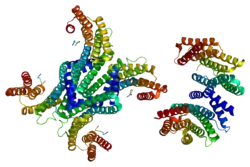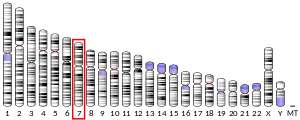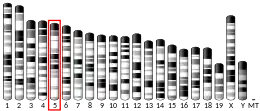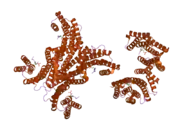YWHAG
14-3-3 protein gamma is a protein that in humans is encoded by the YWHAG gene.[5][6]
This gene product belongs to the 14-3-3 protein family which mediate signal transduction by binding to phosphoserine-containing proteins. This highly conserved protein family is found in both plants and mammals, and this protein is 100% identical to the rat ortholog. It is induced by growth factors in human vascular smooth muscle cells, and is also highly expressed in skeletal and heart muscles, suggesting an important role for this protein in muscle tissue. It has been shown to interact with RAF1 and protein kinase C, proteins involved in various signal transduction pathways.[7]
Interactions
YWHAG has been shown to interact with C-Raf,[6][8][9] EPB41L3,[8][10] KIF1C[11] and Stratifin.[12]
References
- GRCh38: Ensembl release 89: ENSG00000170027 - Ensembl, May 2017
- GRCm38: Ensembl release 89: ENSMUSG00000051391 - Ensembl, May 2017
- "Human PubMed Reference:". National Center for Biotechnology Information, U.S. National Library of Medicine.
- "Mouse PubMed Reference:". National Center for Biotechnology Information, U.S. National Library of Medicine.
- Horie M, Suzuki M, Takahashi E, Tanigami A (September 1999). "Cloning, expression, and chromosomal mapping of the human 14-3-3gamma gene (YWHAG) to 7q11.23". Genomics. 60 (2): 241–3. doi:10.1006/geno.1999.5887. PMID 10486217.
- Autieri MV, Carbone CJ (July 1999). "14-3-3Gamma interacts with and is phosphorylated by multiple protein kinase C isoforms in PDGF-stimulated human vascular smooth muscle cells". DNA and Cell Biology. 18 (7): 555–64. doi:10.1089/104454999315105. PMID 10433554.
- "Entrez Gene: YWHAG tyrosine 3-monooxygenase/tryptophan 5-monooxygenase activation protein, gamma polypeptide".
- Ewing RM, Chu P, Elisma F, Li H, Taylor P, Climie S, McBroom-Cerajewski L, Robinson MD, O'Connor L, Li M, Taylor R, Dharsee M, Ho Y, Heilbut A, Moore L, Zhang S, Ornatsky O, Bukhman YV, Ethier M, Sheng Y, Vasilescu J, Abu-Farha M, Lambert JP, Duewel HS, Stewart II, Kuehl B, Hogue K, Colwill K, Gladwish K, Muskat B, Kinach R, Adams SL, Moran MF, Morin GB, Topaloglou T, Figeys D (2007). "Large-scale mapping of human protein-protein interactions by mass spectrometry". Molecular Systems Biology. 3 (1): 89. doi:10.1038/msb4100134. PMC 1847948. PMID 17353931.
- Van Der Hoeven PC, Van Der Wal JC, Ruurs P, Van Dijk MC, Van Blitterswijk J (January 2000). "14-3-3 isotypes facilitate coupling of protein kinase C-zeta to Raf-1: negative regulation by 14-3-3 phosphorylation". The Biochemical Journal. 345 Pt 2 (2): 297–306. doi:10.1042/0264-6021:3450297. PMC 1220759. PMID 10620507.
- Yu T, Robb VA, Singh V, Gutmann DH, Newsham IF (August 2002). "The 4.1/ezrin/radixin/moesin domain of the DAL-1/Protein 4.1B tumour suppressor interacts with 14-3-3 proteins". The Biochemical Journal. 365 (Pt 3): 783–9. doi:10.1042/BJ20020060. PMC 1222735. PMID 11996670.
- Dorner C, Ullrich A, Häring HU, Lammers R (November 1999). "The kinesin-like motor protein KIF1C occurs in intact cells as a dimer and associates with proteins of the 14-3-3 family". The Journal of Biological Chemistry. 274 (47): 33654–60. doi:10.1074/jbc.274.47.33654. PMID 10559254.
- Benzinger A, Muster N, Koch HB, Yates JR, Hermeking H (June 2005). "Targeted proteomic analysis of 14-3-3 sigma, a p53 effector commonly silenced in cancer". Molecular & Cellular Proteomics. 4 (6): 785–95. doi:10.1074/mcp.M500021-MCP200. PMID 15778465.
Further reading
- Morrison D (October 1994). "14-3-3: modulators of signaling proteins?". Science. 266 (5182): 56–7. doi:10.1126/science.7939645. PMID 7939645.
- Kino T, Pavlakis GN (April 2004). "Partner molecules of accessory protein Vpr of the human immunodeficiency virus type 1". DNA and Cell Biology. 23 (4): 193–205. doi:10.1089/104454904773819789. PMID 15142377.
- Kino T, Chrousos GP (June 2004). "Human immunodeficiency virus type-1 accessory protein Vpr: a causative agent of the AIDS-related insulin resistance/lipodystrophy syndrome?". Annals of the New York Academy of Sciences. 1024: 153–67. doi:10.1196/annals.1321.013. PMID 15265780. S2CID 23655886.
- Roth D, Morgan A, Martin H, Jones D, Martens GJ, Aitken A, Burgoyne RD (July 1994). "Characterization of 14-3-3 proteins in adrenal chromaffin cells and demonstration of isoform-specific phospholipid binding". The Biochemical Journal. 301 ( Pt 1) (1): 305–10. doi:10.1042/bj3010305. PMC 1137176. PMID 8037685.
- Vincenz C, Dixit VM (August 1996). "14-3-3 proteins associate with A20 in an isoform-specific manner and function both as chaperone and adapter molecules". The Journal of Biological Chemistry. 271 (33): 20029–34. doi:10.1074/jbc.271.33.20029. PMID 8702721.
- Autieri MV, Haines DS, Romanic AM, Ohlstein EH (November 1996). "Expression of 14-3-3 gamma in injured arteries and growth factor- and cytokine-stimulated human vascular smooth muscle cells". Cell Growth & Differentiation. 7 (11): 1453–60. PMID 8930394.
- Ku NO, Liao J, Omary MB (April 1998). "Phosphorylation of human keratin 18 serine 33 regulates binding to 14-3-3 proteins". The EMBO Journal. 17 (7): 1892–906. doi:10.1093/emboj/17.7.1892. PMC 1170536. PMID 9524113.
- Dorner C, Ullrich A, Häring HU, Lammers R (November 1999). "The kinesin-like motor protein KIF1C occurs in intact cells as a dimer and associates with proteins of the 14-3-3 family". The Journal of Biological Chemistry. 274 (47): 33654–60. doi:10.1074/jbc.274.47.33654. PMID 10559254.
- Pierrat B, Ito M, Hinz W, Simonen M, Erdmann D, Chiesi M, Heim J (May 2000). "Uncoupling proteins 2 and 3 interact with members of the 14.3.3 family". European Journal of Biochemistry. 267 (9): 2680–7. doi:10.1046/j.1432-1327.2000.01285.x. PMID 10785390.
- Lizcano JM, Morrice N, Cohen P (July 2000). "Regulation of BAD by cAMP-dependent protein kinase is mediated via phosphorylation of a novel site, Ser155". The Biochemical Journal. 349 (Pt 2): 547–57. doi:10.1042/0264-6021:3490547. PMC 1221178. PMID 10880354.
- Rena G, Prescott AR, Guo S, Cohen P, Unterman TG (March 2001). "Roles of the forkhead in rhabdomyosarcoma (FKHR) phosphorylation sites in regulating 14-3-3 binding, transactivation and nuclear targetting". The Biochemical Journal. 354 (Pt 3): 605–12. doi:10.1042/0264-6021:3540605. PMC 1221692. PMID 11237865.
- Elder RT, Yu M, Chen M, Zhu X, Yanagida M, Zhao Y (September 2001). "HIV-1 Vpr induces cell cycle G2 arrest in fission yeast (Schizosaccharomyces pombe) through a pathway involving regulatory and catalytic subunits of PP2A and acting on both Wee1 and Cdc25". Virology. 287 (2): 359–70. doi:10.1006/viro.2001.1007. PMID 11531413.
- Peyrl A, Weitzdoerfer R, Gulesserian T, Fountoulakis M, Lubec G (January 2002). "Aberrant expression of signaling-related proteins 14-3-3 gamma and RACK1 in fetal Down syndrome brain (trisomy 21)". Electrophoresis. 23 (1): 152–7. doi:10.1002/1522-2683(200201)23:1<152::AID-ELPS152>3.0.CO;2-T. PMID 11824616. S2CID 12931652.
- Johnson BA, Stehn JR, Yaffe MB, Blackwell TK (May 2002). "Cytoplasmic localization of tristetraprolin involves 14-3-3-dependent and -independent mechanisms". The Journal of Biological Chemistry. 277 (20): 18029–36. doi:10.1074/jbc.M110465200. PMID 11886850.
- Yu T, Robb VA, Singh V, Gutmann DH, Newsham IF (August 2002). "The 4.1/ezrin/radixin/moesin domain of the DAL-1/Protein 4.1B tumour suppressor interacts with 14-3-3 proteins". The Biochemical Journal. 365 (Pt 3): 783–9. doi:10.1042/BJ20020060. PMC 1222735. PMID 11996670.
- Graeser R, Gannon J, Poon RY, Dubois T, Aitken A, Hunt T (September 2002). "Regulation of the CDK-related protein kinase PCTAIRE-1 and its possible role in neurite outgrowth in Neuro-2A cells" (PDF). Journal of Cell Science. 115 (Pt 17): 3479–90. doi:10.1242/jcs.115.17.3479. PMID 12154078.
- Nellist M, Goedbloed MA, de Winter C, Verhaaf B, Jankie A, Reuser AJ, van den Ouweland AM, van der Sluijs P, Halley DJ (October 2002). "Identification and characterization of the interaction between tuberin and 14-3-3zeta". The Journal of Biological Chemistry. 277 (42): 39417–24. doi:10.1074/jbc.M204802200. PMID 12176984.





